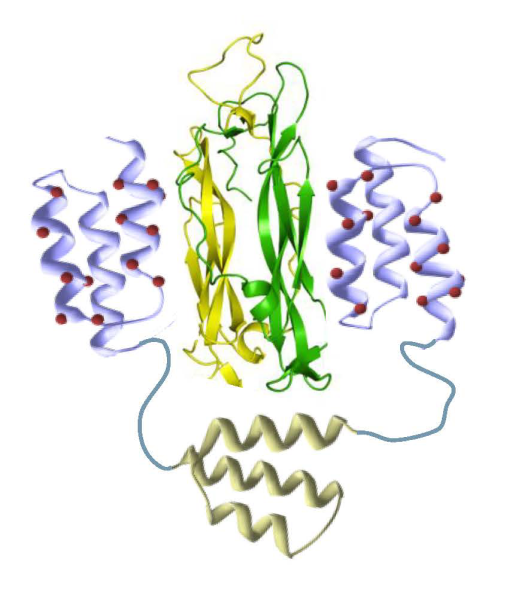Acelyrin Inc. wrapped up 2021 with a $250 million Series B financing round and a licensing agreement with Affibody AB for a treatment of inflammatory diseases.
The Woodland Hills-based biopharmaceutical company focuses on acquiring and licensing drugs in development, with the anti-inflammatory treatment Izokibep as its first deal. Acelyrin’s overarching goal is to build a long-term, sustainable pharmaceutical company with a robust pipeline, fully integrated research and development and commercialization capabilities, said Acelyrin Chief Executive Dr. Shao-Lee Lin.
She added that the company has an eye to go public within the context of 2022 and that such a decision will depend on the status of market forces.
Acelyrin’s financing round last month represented the largest amount received by a local biotech company in 2021, according to Ahmed Enany, chief executive of the Southern California Biomedical Council in Los Angeles. Westlake Village-based Capsida Biotherapeutics is the closest competitor, having secured in April a total investment of $140 million via a $50 million Series A and an upfront $90 million multi-year strategic collaboration and option agreement with AbbVie. The agreement involved targeted gene therapies for neurogenerative diseases.
Acelyrin’s Series B will be used to fund licensing and acquisition of additional programs, with a focus on immunology and accelerating the development of inflammatory treatment Izokibep, according to a statement.
Under the agreement’s terms, Acelyrin obtained global rights to Izokibep “except development and commercialization by Inmagene Biopharmaceuticals Co. Ltd. in selected Asian countries, including China, Hong Kong, South Korea, and Taiwan, and excluding Japan, and commercialization by Affibody in the Nordic Countries,” according to a statement.
The Affibody collaboration also gives Acelyrin an option to license additional molecules developed by Affibody.
“I think that we are fortunate to have a syndicate of really blue-chip investors who are recognizing our potential to identify and license and develop transformative therapies to help millions of people with serious diseases,” Dr. Lin said.
The financing round was led by Westlake Village BioPartners; AyurMaya, an affiliated fund of Matrix Capital Management; and Surveyor Capital. Other investors included Cowen Healthcare Investments, Decheng Capital, Marshall Wace, OrbiMed, RTW Investments, Samsara BioCapital, Tybourne Capital Management and venBio Partners.
“As the lead Series A investor, we want to thank and welcome this impressive group of Series B investors in joining us to support Acelyrin,” Dr. Sean Harper, Westlake Village BioPartners’ co-founding managing director, said in a statement. “This is a management team we know well and have every confidence will achieve its goal of building a fully integrated biopharma company with a robust pipeline and broad research, development and commercialization capabilities.”
Drugs to market
Dr. Lin said that the combination of the Izokibep program and quality of Acelyrin’s team is what contributed to receiving a quarter of a billion dollars in Series B financing. The company’s Series A was completed in October 2020, about a year before its Series B was closed, according to Dr. Lin.
Enany wrote in an email what he finds interesting about Acelyrin is its team and leaders, such as Dr. Lin, who know how to bring new drugs to market. Dr. Lin oversaw the development of Tepezza at Horizon Therapeutics. The drug reduces eye bulging and double vision and improves the symptoms of Thyroid Eye Disease.
“The money raised will help in bankrolling a pivotal trial and two phase 2b studies of Affibody’s Izokibep, an antibody mimetic IL-17A inhibitor,” Enany added in the email. “If these studies and Phase III trials are completed without major hiccups, they will have a faster pathway to market.”
IL-17 is a group of proteins secreted by cells in the immune system. The specific chemical IL-17A plays a role in diseases such as plaque psoriasis, psoriatic arthritis, as well as eye and gland inflammation, according to the Acelyrin website. Izokibep inhibits IL-17A, thus reducing inflammation.
Acelyrin announced in December positive interim results from a global Phase II trial of Izokibep in patients with psoriatic arthritis.
Enany wrote that the experience of Acelyrin’s founders and managers will help the company navigate the process of developing new drugs and keep them from avoiding mistakes that biotech startups typically make.
However, Enany wrote, Acelyrin is not without serious competition from the likes of Novartis’ Cosentyx and Eli Lilly Co.’s Taltz, both of which utilize the same IL-17 pathway that Izokibep does. There are also other emerging companies hoping to capitalize on the pathway, according to Enany.
“These include well-funded companies such as Dice Therapeutics, which had a successful IPO garnering $204 million and MoonLake Immunotherapeutics (in Schweiz/Switzerland) which had a $230 million SPAC deal to support mid-stage studies,” Enany wrote. “I am sure the Acelyrin team and their investors know that and have an ace or two up their sleeves.”
‘Additional targets’
Dr. Lin said the value proposition that Acelyrin brings to the table lies in its network within the global pharma industry with companies both big and small, such as Affibody, which is based in Sweden.
“As the innovators of Izokibep, we’re honored to work with Acelyrin to unlock this molecule’s potential and address promising new indications and solve unmet needs,” David Bejker, Affibody’s chief executive, said in a statement. “In addition, we look forward to working with the Acelyrin team to select additional targets and build new programs, in parallel with the development of Izokibep.”
In terms of geography, Dr. Lin emphasized the importance of Acelyrin’s pharmaceutical connections.
“We really have the opportunity now to have a reach not just within our own territories, globally, but also boots on the ground, if you will, in Europe as well as Asia as part of this global strategy and approach,” Dr. Lin said. “And the meaningfulness of that, from my perspective, is that we have the broadest reach in terms of patients that we ultimately might be able to help.”
